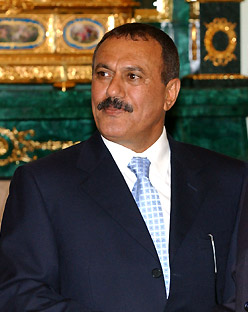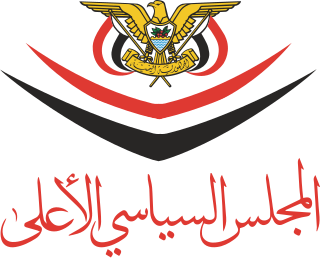
The Politics of Yemen are in an uncertain state due to the Houthi takeover in Yemen. An armed group known as the Houthis or Ansar Allah seized control of the Northern Yemeni government and announced it would dissolve parliament, as well as install a "presidential council", "transitional national council", and "supreme revolutionary council" to govern the country for an interim period. However, the deposed president, Abdrabbuh Mansur Hadi, has declared he is still in office and is working to establish a rival government in Aden.

Ali Abdullah Saleh al-Ahmar was a Yemeni politician who served as the first President of the Republic of Yemen, from Yemeni unification on 22 May 1990, to his resignation on 25 February 2012, following the Yemeni Revolution. Previously, he had served as President of the Yemen Arab Republic, or North Yemen, from July 1978, to 22 May 1990, after the assassination of President Ahmad al-Ghashmi.

The General People's Congress is a political party in Yemen. It has been the de jure ruling party of Yemen since 1993, three years after unification. The party is dominated by a nationalist line, and its official ideology is Arab nationalism, seeking Arab unity. In the course of the Yemeni Civil War, the party's founder and leader Ali Abdullah Saleh was killed, while the GPC fractured into three factions backing different sides in the conflict.

The president of the Republic of Yemen is the head of state of Yemen. Under the Constitution of Yemen, the president is also the Supreme Commander of the Armed Forces and head of the executive branch of the Yemeni government.

Elections in Yemen take place within the framework of a presidential system, with both the President and House of Representatives elected by the public. Due to political instability, elections have not been held regularly since the early 2000s.

The Yemeni Socialist Party is a political party in Yemen. A successor of Yemen's National Liberation Front, it was the ruling party in South Yemen until Yemeni unification in 1990. Originally Marxist–Leninist, the party has gradually evolved into a social democratic opposition party in today's unified Yemen.

The House of Representatives is the lower house of the Parliament of Yemen. It shares the legislative power with the Shura Council, the upper house. The Assembly of Representatives has 301 members, elected for a six-year term in single-seat constituencies. It is one of the rare parliamentary chambers in the world to currently have no female representation.
The modern history of Yemen began with the withdrawal of the Ottoman Empire. In 1839 the British set up a protective area around the southern port of Aden and in 1918 the northern Kingdom of Yemen gained independence from the Ottoman Empire. North Yemen became a republic in 1962, but it was not until 1967 that the British Empire withdrew from what became South Yemen. In 1970, the southern government adopted a communist governmental system. The two countries were formally united as the Republic of Yemen on May 22, 1990.

The Constitution of Yemen was ratified by popular referendum on May 16, 1991. It defines the republic as an independent and sovereign Arab and Islamic country and establishes sharia, or Islamic law, as the basis of all laws. In February 2001, several amendments were passed by national referendum extending the presidential term to seven years and the parliamentary term to six years and increasing the size and authority of the Shura Council.

Abdrabbuh Mansur Hadi is a Yemeni politician and former field marshal of the Yemeni Armed Forces who served as the president of Yemen from 2012 until 2022, when he stepped down and transferred executive authority to the Presidential Leadership Council, with Rashad al-Alimi as its chairman. He was the vice president to Ali Abdullah Saleh from 1994 to 2012.

The Yemeni Revolution followed the initial stages of the Tunisian Revolution and occurred simultaneously with the 2011 Egyptian revolution and other Arab Spring protests in the Middle East and North Africa. In its early phase, protests in Yemen were initially against unemployment, economic conditions and corruption, as well as against the government's proposals to modify Yemen's constitution. The protesters' demands then escalated to calls for the resignation of Yemeni President Ali Abdullah Saleh. Mass defections from the military, as well as from Saleh's government, effectively rendered much of the country outside of the government's control, and protesters vowed to defy its authority.

Presidential elections were held in Yemen on 21 February 2012. Acting President Abdrabbuh Mansur Hadi was the only candidate, and was subsequently sworn into office on 25 February 2012. As of 2024 this is the last presidential election in Yemen, as the country descended into civil war two years later.

Yemeni peace process refers to the proposals and negotiations to pacify the Yemeni Crisis by arranging a power transfer scheme within the country and later cease-fire attempts within the raging civil war. While initially unsuccessful, the reconciliation efforts resulted with presidential elections, held in Yemen in February 2012. The violence in Yemen, however, continued during the elections and after, culminating in Houthi seizure of power and the ensuing civil war.

The National Dialogue Conference (NDC) was a transitional dialogue process held at the Movenpick Hotel in Sanaa, Yemen from March 18, 2013 to January 24, 2014, as part of the Yemeni crisis reconciliation efforts.

The Houthi takeover in Yemen, also known as the September 21 Revolution, or 2014–15 coup d'état, was a popular revolution against Yemeni President Abdrabbuh Mansur Hadi led by the Houthis and their supporters that pushed the Yemeni government from power. It had origins in Houthi-led protests that began the previous month, and escalated when the Houthis stormed the Yemeni capital Sanaa on 21 September 2014, causing the resignation of Prime Minister Mohammed Basindawa, and later the resignation of President Abdrabbuh Mansur Hadi and his ministers on 22 January 2015 after Houthi forces seized the presidential palace, residence, and key military installations, and the formation of a ruling council by Houthi militants on 6 February 2015.

The Yemeni Crisis began with the 2011–2012 revolution against President Abdullah Saleh, who had led Yemen for 33 years. After Saleh left office in early 2012 as part of a mediated agreement between the Yemeni government and opposition groups, the government led by Saleh's former vice president, Abdrabbuh Mansur Hadi, struggled to unite the fractious political landscape of the country and fend off threats both from Al-Qaeda in the Arabian Peninsula and from Houthi militants that had been waging a protracted insurgency in the north for years.

The aftermath of the Houthi takeover in Yemen refers to developments following the Houthis' takeover of the Yemeni capital of Sana'a and dissolution of the government, which eventually led to a civil war and the Saudi Arabian-led intervention in Yemen.

The Supreme Political Council is a largely unrecognised executive body formed by the Houthi movement and the General People's Congress (GPC) to rule Yemen. Formed on 28 July 2016, the presidential council consists of nine members and was headed by Saleh Ali al-Sammad as president until his death from a drone air strike on 19 April 2018 with Qassem Labozah as vice-president. The territory that it rules consists most of the former North Yemen, which united with South Yemen in 1990.

The Battle of Sanaa (2017) was fought between forces loyal to Ali Abdullah Saleh and the Houthis in the Yemeni capital of Sana'a. Both sides were allied during the 2014–15 Houthi takeover of the government but the alliance ended when Saleh decided to break ranks with the Houthis and call for dialogue with Saudi Arabia and the United Arab Emirates, who are leading a military intervention in Yemen. Fighting then broke out between the Houthis and forces loyal to Saleh as the Saudi-led coalition began bombing Houthi areas, ultimately resulting in Saleh's death and a Houthi victory.

The Shura Council or Consultative Council is the upper house of the parliament of Yemen, with the lower house being the House of Representatives. Unlike the House it does not take on a legislative role, instead primarily being charged with an advisory role to the president. Per the constitution it has 111 members who are appointed by the president. There currently exist two Shura Councils as a result of the civil war, one in Sanaa aligned with the Houthis, and one aligned with the Presidential Leadership Council in Aden.











